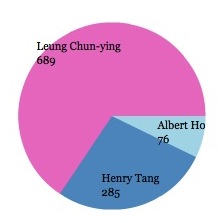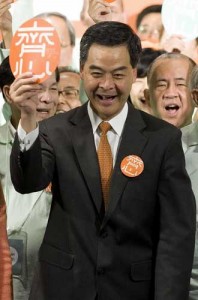After one of the most raucous campaigns in Hong Kong’s — or China’s — history, Leung Chun-ying has emerged as the victor in Hong Kong’s election for a new chief executive.![]()
![]()
Leung won 689 votes from the 1,200-member Elections Committee to just 285 votes for Henry Tang and 76 for pro-democracy candidate Albert Ho:

The race had become unexpectedly chaotic over the past months — the initial frontrunner Tang was plagued first by infidelity accusations and then by more serious scandals about illegal construction of a basement in his home — culminating in a media frenzy outside his Hong Kong building. Tang was also almost certainly hurt by other corruption charges that recently emerged the outgoing chief executive Donald Tsang, in whose administration Tang had played key roles.
Although both Tang and Leung were seen as sufficiently pro-Beijing, Tang’s missteps and scandals made him wildly unpopular among the Hong Kong populace at large, with Leung leading most preference polls during the campaign.
Looking forward, perhaps the most important lesson of the race is that Hong Kong –and China — can withstand the sometimes messy process of popular democracy and the media coverage that accompanies it.
China has indicated it will permit a direct election in the 2017 chief executive race — if it follows through with that promise, PRC officials can look to the 2012 race as a promising precedent on the road to full democracy for the special administrative region. Beijing’s dexterity in shifting its support, however subtle, from Tang to Leung, demonstrates that it would have been able to recognize with equal grace a popular vote resulting in Leung’s election as well. More strident voices — like those of the Democracy Party and Albert Ho — have been met with damp enthusiasm from Hong Kong residents and elites alike, who are pragmatic in realizing that the chief executive must be able to work with, and not against, China’s leadership.
